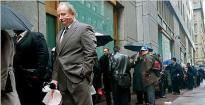America's 15 Million Missing Jobs
America’s jobs crisis began a decade ago. Long before the housing bubble burst and Wall Street melted down, something in our national job-creation machine went horribly wrong.
The years between the brief 2001 recession and the 2008 financial collapse gave us solid growth in our gross national product, soaring corporate profits, and a low unemployment rate—but job creation lagged stubbornly behind, more so than in any economic expansion since World War II.
The Great Recession wiped out what amounts to every U.S. job created in the 21st century. But even if the recession had never happened, if the economy had simply treaded water, the United States would have entered 2010 with 15 million fewer jobs than economists say it should have.
Somehow, rapid advancements in technology and the opening of new international markets paid dividends for American companies but not for American workers. An economy that long thrived on its dynamism, shedding jobs in outdated and less competitive industries and adding them in innovative new fields, fell stagnant in the swirls of the most globalized decade of commerce in human history.
Even now, no one really knows why.
This we do know: The U.S. economy created fewer and fewer jobs as the 2000s wore on. Turnover in the job market slowed as workers clung to the positions they held. Job destruction spiked in each of the decade’s two recessions. In contrast to the pattern of past recessions, when many employers recalled laid-off workers after growth picked up again, this time very few of those jobs came back.
These are the first clues—incomplete, disconcerting, and largely overlooked—to a critical mystery bedeviling a nation struggling to crawl out of near-double-digit unemployment. We know what should have transpired over the past 10 years: the completion of a circle of losses and gains from globalization. Emerging technology helped firms send jobs abroad or replace workers with machines; it should have also spawned domestic investment in innovative industries, companies, and jobs. That investment never happened—not nearly enough of it, in any case.
If we can’t figure out why, we may be doomed to a future that feels like a long jobless recovery, no matter how fast our economy grows. “It’s the trillion-dollar question,” says David E. Altig, senior vice president and research director for the Federal Reserve Bank of Atlanta, where economists are beginning to explore the shifts that have clubbed American workers like a blackjack. “Something big has happened. I really don’t think we have a complete story yet.”
Click here to read the rest.


